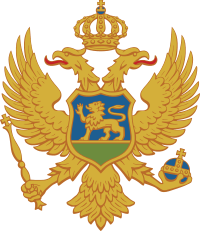Montenegrin parliamentary election, 2009
| | ||||||||||||||||||||||||||||||||||||||
| ||||||||||||||||||||||||||||||||||||||
| ||||||||||||||||||||||||||||||||||||||
| ||||||||||||||||||||||||||||||||||||||
 |
| This article is part of a series on the politics and government of Montenegro |
| Constitution |
|
Legislative |
|
Judiciary
|
|
Executive |
|
|
Politics portal |
Early parliamentary elections were held in Montenegro on 29 March 2009. In addition to elections for the unicameral Parliament of Montenegro, concurrent local elections were held in Nikšić and Budva, as well as municipal presidential elections in Herceg Novi and Tivat.[1] The parliamentary elections were the eighth since the reintroduction of multi-party system in 1990, and the second since regaining full independence in 2006.
Background
President Filip Vujanović the parliamentary elections on 27 January 2009, after the Parliament of Montenegro decided the previous day to shorten its term, although this decision was controversial. The Constitutional Act that proclaimed the new constitution of 2007 stipulated that elections had to be held by the end of 2009.[2]
Application of electoral lists occurred from 16 February to 4 March 2009, and election silence began on 27 March 2009.[3] The number of MPs being elected was uncertain, because the matter was never solved before the election was scheduled. Based on a count of one MP per six thousand eligible voters, the number of MPs should have been 82. However, the Constitution stipulated 81, as there were in the present outgoing session, and this was the number of MPs actually elected.
The pre-electoral process had been marked by several major incidents, such as the revocation of citizenship of Predrag Popović, president of the People's Party,[4] the violation of the human right to work during the formation of the coalition treaty of Prime Minister Milo Đukanović's ruling coalition, which would make party affiliation a criterion for employment, and repeated protests by discontented workers pushed into poverty.[5][6] Additionally, representative groups of Montenegro's minority communities unanimously declared the forthcoming elections illegal and contrary to constitutional protections granted to ethnic communities.
Electoral system
Elections in Montenegro are free, with the right of secret ballot guaranteed. Because the country has a single national voting district, all votes cast at individual voting stations across the country went towards a single total. The electoral threshold was 3%, so electoral lists receiving under three percent of the total votes cast were crossed out, and the MPs within the assembly were split amongst the remaining lists. Seats were distributed by the D'Hondt method, which slightly favors leading lists above the smaller ones. The Parliament's mandate lasts four years.
Campaign
Several alliances were created prior to the elections; the Coalition for a European Montenegro led by Milo Đukanović included the Democratic Party of Socialists of Montenegro, the Social Democratic Party of Montenegro, the Croatian Civic Initiative and the Bosniak Party. The People's Coalition was formed by the People's Party and the Democratic Serb Party, whilst For a Different Montenegro, led by Goran Batričević, consisted of the Democratic Centre and the Liberal Party of Montenegro.
Results
The Coalition for a European Montenegro won an absolute majority of seats, with approximately 65 percent voter turnout, securing Milo Đukanović a sixth term as Prime Minister.[7][8]
| Party | Votes | % | Seats | +/– | ||
|---|---|---|---|---|---|---|
| Main | Albanian | Total | ||||
| Coalition for a European Montenegro | 168,290 | 51.9 | 47 | 1 | 48 | +5 |
| Socialist People's Party of Montenegro | 54,547 | 16.8 | 16 | 0 | 16 | +8 |
| New Serb Democracy | 29,883 | 9.2 | 8 | 0 | 8 | New |
| Movement for Changes | 49,546 | 6.0 | 5 | 0 | 5 | –6 |
| People's Coalition (NS–DSS) | 9,448 | 2.9 | 0 | 0 | 0 | –3 |
| For a Different Montenegro (LPCG–DC) | 8,759 | 2.7 | 0 | 0 | 0 | –1 |
| Party of Pensioners and Invalids of Montenegro | 7,691 | 2.4 | 0 | 0 | 0 | New |
| Democratic Union of Albanians | 4,747 | 1.5 | 0 | 1 | 1 | 0 |
| Serb National List | 4,291 | 1.3 | 0 | 0 | 0 | New |
| Bosniaks and Muslims Together as One | 3,489 | 1.1 | 0 | 0 | 0 | New |
| New Democratic Power – FORCA | 2,939 | 0.9 | 0 | 1 | 1 | +1 |
| Albanian List (DUA–AA) | 2,898 | 0.9 | 0 | 1 | 1 | 0 |
| Albanian Coalition "Perspective" | 2,619 | 0.8 | 0 | 1 | 1 | New |
| Fatherland Serbian Party | 2,446 | 0.8 | 0 | 0 | 0 | New |
| Montenegrin Communists | 1,594 | 0.5 | 0 | 0 | 0 | 0 |
| Party of Democratic Prosperity | 805 | 0.2 | 0 | 0 | 0 | – |
| Invalid/blank votes | 5,827 | – | – | – | – | – |
| Total | 329,819 | 100 | 76 | 5 | 81 | 0 |
| Registered voters/turnout | 498,305 | 66.2 | – | – | – | – |
| Source: Nohlen & Stöver[9] | ||||||
References
- ↑ http://snp.co.me/vijesti.asp?kat=11&id=3264
- ↑ Official Paper of Montenegro, n. 1/2007
- ↑ http://www.mtsmondo.com/news/vesti/text.php?vest=122570
- ↑ http://in4s.net/x/index.php?option=com_content&view=article&id=5952:lider-narodne-stranke-crne-gore-gubi-crnogorsko-dravljanstvo&catid=67:drugi-pisu&Itemid=192
- ↑ http://in4s.net/x/index.php?option=com_content&view=article&id=6025:sezona-trajkova-dogorelo-do-vlade&catid=58:cg&Itemid=181
- ↑ http://in4s.net/x/index.php?option=com_content&view=article&id=6064:traimo-samo-svoje&catid=58:cg&Itemid=181
- ↑ Milo Djukanovic wins a sixth term with 50,8% of the vote
- ↑ Rezultati izbora – Crna Gora – 2009
- ↑ Nohlen, D & Stöver, P (2010) Elections in Europe: A data handbook, p2052 ISBN 978-3-8329-5609-7
External links
- Electoral Commission
- Check of the Electoral List
- The Center for Monitoring CEMI
- The Center for Democratic Transition
- Analysis by the International Institute for Middle East and Balkan studies
- Analysis by the French Robert Schuman Foundation
| ||||||||||||||||||||||
